How to know if a product is vegan-friendly? This vegan ingredients check lets you know about the most common non-vegan items in food, clothing, cosmetics and more.
Feeling overwhelmed by the thought of choosing vegan-friendly items at the store? Perhaps the jungle of reading labels has kept you from going vegan so far — it’s time to change that.
Due to the increasing demand for vegan products, a lot of companies decide to add vegan labels. Whether that be a “Certified Vegan” logo or something like “Suitable for Vegans”, it’s getting easier and easier to spot vegan products right away.
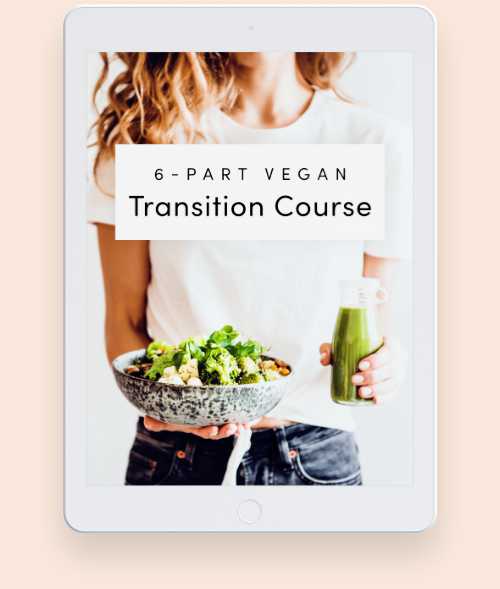
join our free vegan course!
Learn how to thrive on a plant-based diet with practical tips & a 3-day meal plan!
But what if you need to make your way to the ingredients list?
What names can non-vegan items have and what are the best vegan alternatives for your favorite foods?
This guide will help you out! Be sure to grab your printable vegan ingredient checklist together with our grocery list below.
Let’s go over the basics of vegan-approved foods!
What vegans can eat
Here’s a quick overview of what vegans can eat! While the first couple of food groups usually don’t have an ingredient list and therefore don’t need to be double-checked, things are different for processed vegan foods like cookies or mock meats which can contain animal products like eggs.
- Fruits: berries, bananas, apples, oranges, etc.
- Veggies: broccoli, carrots, bell peppers, leafy greens, etc.
- Grains: rice, oats, wheat, barley, pasta, bread, etc.
- Legumes: lentils, black beans, chickpeas, tofu, etc.
- Nuts & seeds: walnuts, cashews, almonds, chia, sunflower seeds, etc.
- Herbs & spices: salt, pepper, cinnamon, paprika, chili, garlic, ginger, etc.
- Beverages: water, tea, coffee, juices, beer, vegan wine, etc.
- Other: mock meats, vegan cheese, frozen meals, Oreos, potato chips, etc.
Read our full article on vegan nutrition and food groups here and grab our printable vegan grocery list below!
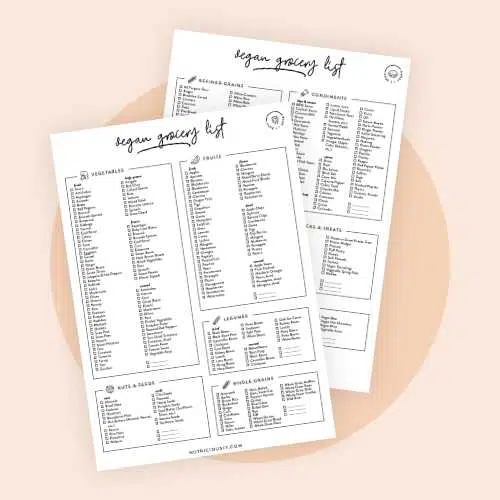
download our free printable vegan grocery list
Grab your free PDF and sign up for our newsletter by entering your email below!
What vegans can’t eat
Let’s talk about the main and most obvious animal products that vegans avoid.
- Meat: beef, chicken, pork, turkey, lamb, etc.
- Seafood: salmon, tuna, shrimp, etc.
- Dairy: milk, cheese, cream, yogurt, whipped cream, butter, etc.
- Eggs (even free-range)
- Honey (even local or organic)
Unfortunately, animal products aren’t always as prominently listed on the ingredients list.
If they are only partially used, they can have a lot of different names which makes it really hard as a new vegan to find vegan-approved products at the store!
Vegan ingredients check
With this vegan ingredients checker, we go beyond food and also include animal-based materials in clothing or cosmetics.
Definitely non-vegan ingredients
- Albumin/Albumen: derived from eggs, used in baked goods
- Anchovy: small fish packed in oil or salt
- Bee Pollen: collected from bees, can be used in food or cosmetics
- Beeswax (E 901): obtained by melting honeycomb in water, used in baked goods, confections, flavorings
- Bone Phosphate (E 542)/Char/Meal: comes from animal bones used in sugar manufacturing
- Butter Fat: dairy-based, used in creams or desserts
- Bristle: stiff animal hair, found in beauty products like brushes
- Calcium Caseinate: milk protein used as a stabilizer
- Casein, Sodium Caseinate (E 469): dairy-based food additive in desserts or coffee whiteners
- Cochineal, Carmine or Natural Red 4 (E 120): insect used for coloring food or makeup.
- Collagen: protein derived from animal sources, used in cosmetics such as skin care creams and powders
- Confectioner’s/Resinous Glaze: made from shellac or beetle juice used in candy or chewing gum
- Coral: sea creatures used in supplements
- Down: undercoating of waterfowl (feathers) used in clothing or bedding
- Estrogen/Estradiol: from cow ovaries and pregnant mares’ urine, found in anti-aging creams, gels and supplements
- Fish Oil: animal-derived, used for supplements
- Gelatin (E 441): obtained from animal skin, tissue or bones; used in sweets and baking
- Ghee: similar to butter and dairy-based, used in Indian cuisine
- Isinglass: obtained from bladders, used as a refiner in certain beers and wines
- Keratin: protein found in hair, hoofs, horns and feathers; used in hair cosmetics
- L-Cysteine (E 910 + 921): derived from hair or feathers, used in bread, medications and cosmetics
- Lactitol (E 966): derived from milk, used as a sweetener or in laxatives and cosmetics
- Lactose: milk sugar
- Lanolin (E 913): byproduct of wool production, used in body lotion or mascara
- Lard/Pork Fat: animal fat
- Leather: animal skin used in apparel or furniture
- Lipase: animal-based enzyme used in confections, margarine or cream
- Lysozyme (E 1105): usually derived from eggs and used in toothpaste or wine production
- Musk: material secreted in a gland or sac by the male musk deer often used as base notes in perfumery
- Myristic Acid: typically from cows or sheep, used in sweets or beverages
- Oleic Acid: typically cow- or hog-derived and used in baked goods, beverages or ice cream
- Pearls: from bivalves used for jewelry
- Pancreatin: pancreatic acid from animals in digestive aid products
- Pepsin: animal-derived enzyme in cheese products and digestive aids
- Placenta: organ from an animal found in supplements and cosmetics
- Polysorbate: typically a composite of animal, vegetable, and synthetic material; used in dressings, baked goods, soups, soft drinks & more
- Propolis: resin created by bees, found in supplements, throat sprays or skin gels
- Rennet: enzymes from a calf used in cheese and custard
- Royal Jelly: produced by bees and used in supplements
- Shellac/Lac-Resin (E 904): insect secretion, used as a glazing agent or wood finishing
- Silk: cloth made from the fiber produced by larvae
- Simplesse: comes from milk and eggs and is used in margarine, dressings and ice cream.
- Suede: tanned skin of an animal
- Suet: solid fat from the kidneys of cattle or sheep, found in several traditional British dishes
- Tallow: hard animal fat, used for the production of shortening but also found in skin moisturizers
- Trypsin: animal-derived digestive enzyme, used as a baking enzyme or to tenderize meat
- Whey: residue from dairy milk, used in protein shakes
- Wool: hair from sheep used in human clothing
Possibly non-vegan ingredients
- Activated Carbon: can be vegetable- or bone-derived, used to add a dark coloring to products
- Cane Sugar: some sugars can be filtered with animal bones
- Capric/Caprylic Acid: can be sourced from animals and vegetables; used in candies and baked goods
- Clarifying Agent: used to filter small particles out of liquids, can be from animals
- Emulsifier: wetting agent which can be from vegetables, animals or synthetic
- Enzymes: can be sourced from vegetables, animals or synthetic, used in food and cosmetics
- Fat/Fatty Acids: source can be animal (cow- or hog-derived), vegetable or synthetic
- Flavor Enhancer: source can be animal (meat or fish extract) or vegetable
- Folic Acid: typically fungal or synthetic, can be animal-derived, used as a dietary supplement and in food fortification
- Glycerol/Glycerin: can be vegetable-, synthetic- or animal-derived, used in baked goods, beverages, ice cream and more
- Lactase: typically fungal but can be animal-based, used as a dietary supplement
- Lecithin (E 322): usually derived from veggies but can be from liver or eggs yolks; used in margarine, baked goods, sweets & more
- Lipids: can be plant- or animal-based, used in food and cosmetics
- Lutein: can be from egg yolks or vegetables, used for supplements or coloring
- Modified Starch: found in desserts and sauces, can contain animal-derived oleic acid
- Mono- and Diglycerides (E 471): used in baked goods, shortenings or chewing gum, can be vegetable-, animal-derived or synthetic
- Natural Flavor: can be from veggies or animals (meat, fish, fowl, eggs, or dairy), used in ready-made meals
- Nutritive Sweetener: can refer to vegan sugars or honey in food
- Palmitic Acid: can be animal- or vegetable-derived; used in baked goods and flavorings
- Processing Aid: can be from animals, vegetables, minerals or synthetic; used in sugar, juice, wine and beer
- Protein/Amino Acids: can be from animals or plants
- Sodium Stearoyl Lactylate: can be derived from plant or animal sources, found in baked goods and sauces
- Stearic Acid: can be from veggies, animals or synthetic; used in butter or vanilla flavorings, chewing gums
- Sucrose: can be from non-vegan sugar; used in baked goods, condiments & more
- Vitamin A (Retinol) & D3: can be animal-derived or synthetic; used in supplements, milk, margarine, cereal
- Wax: can be synthetic, vegetable- or animal-derived; typically used in candy or chewing gums
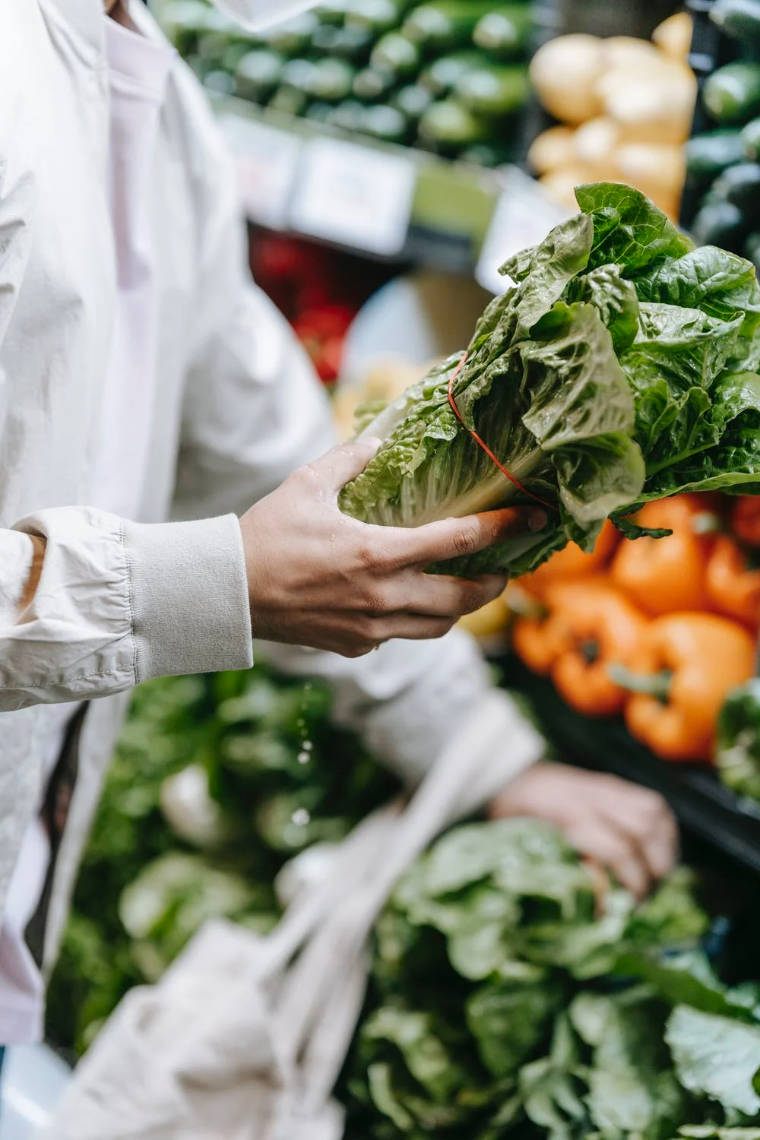
Tips for reading labels
- If you’re new to veganism, just cut out the obvious animal products first, then move on to clear non-vegan ingredients like whey or gelatin and keep the “possibly non-vegan ingredients” for last.
- Look for certified vegan products with a label and don’t mistake a vegetarian label for a vegan one (they can look very similar.)
- Don’t worry about the “may contain traces” part — this is just a note for people who are allergic and refers to foods that have been produced in the same factory.
- Start by skimming the ingredients list for any words that are bolded; companies usually make clear if any allergens are in the product and you can spot dairy, egg or fish-derived ingredients very easily that way.
- Some ingredients, like cocoa butter, lactic acid or carnauba wax, sound very similar to animal-based items but they are actually vegan!
- Once you’ve checked whether a product is vegan-friendly, you can just grab it the next few times at the store without having to think twice. However, companies sometimes change their formulation, so it’s smart to check if a product is still vegan after a while!
- When it comes to cleaning products, personal care products or cosmetics, it’s not just about what’s inside the product but also whether it was tested on animals or not!
- There are cool apps like Is It Vegan or Bunny Free which you can use to scan codes or look for ingredients and brands while shopping.
The easiest way to make sure all of your food is vegan is by going for the basics — fruits, veggies, beans, grains, nuts and seeds.
Whole Food Plant-Dased Diet Guide →More vegan guides
If you liked our lists of non-vegan and possibly non-vegan ingredients, check out the following articles next!
- Transition to a Vegan Lifestyle
- 7-Day Vegan Challenge
- Best Vegan Snack Boxes
- 70+ Vegan Gift Ideas
- Becoming a Plant-Based Family
Did you know about all of these non-vegan ingredients or did any of them surprise you? How do you personally check labels? Comment below and Pin this article here.

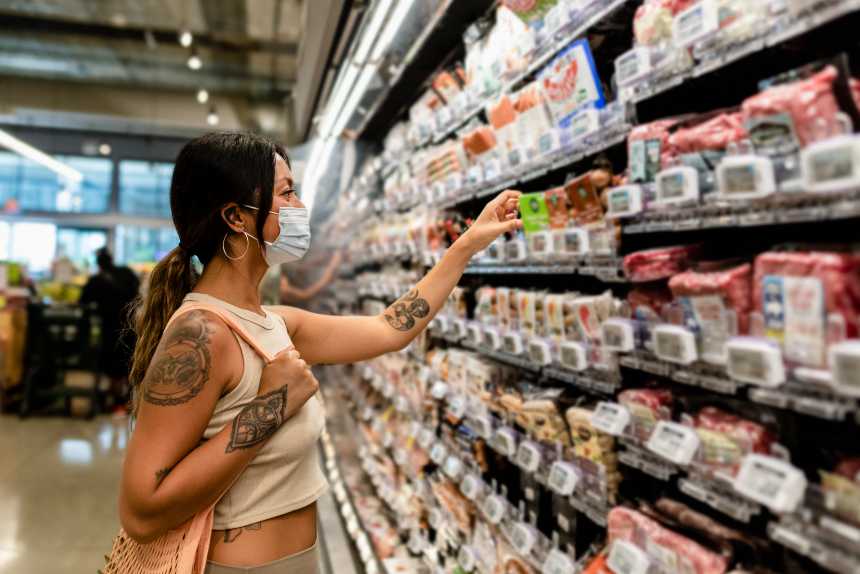
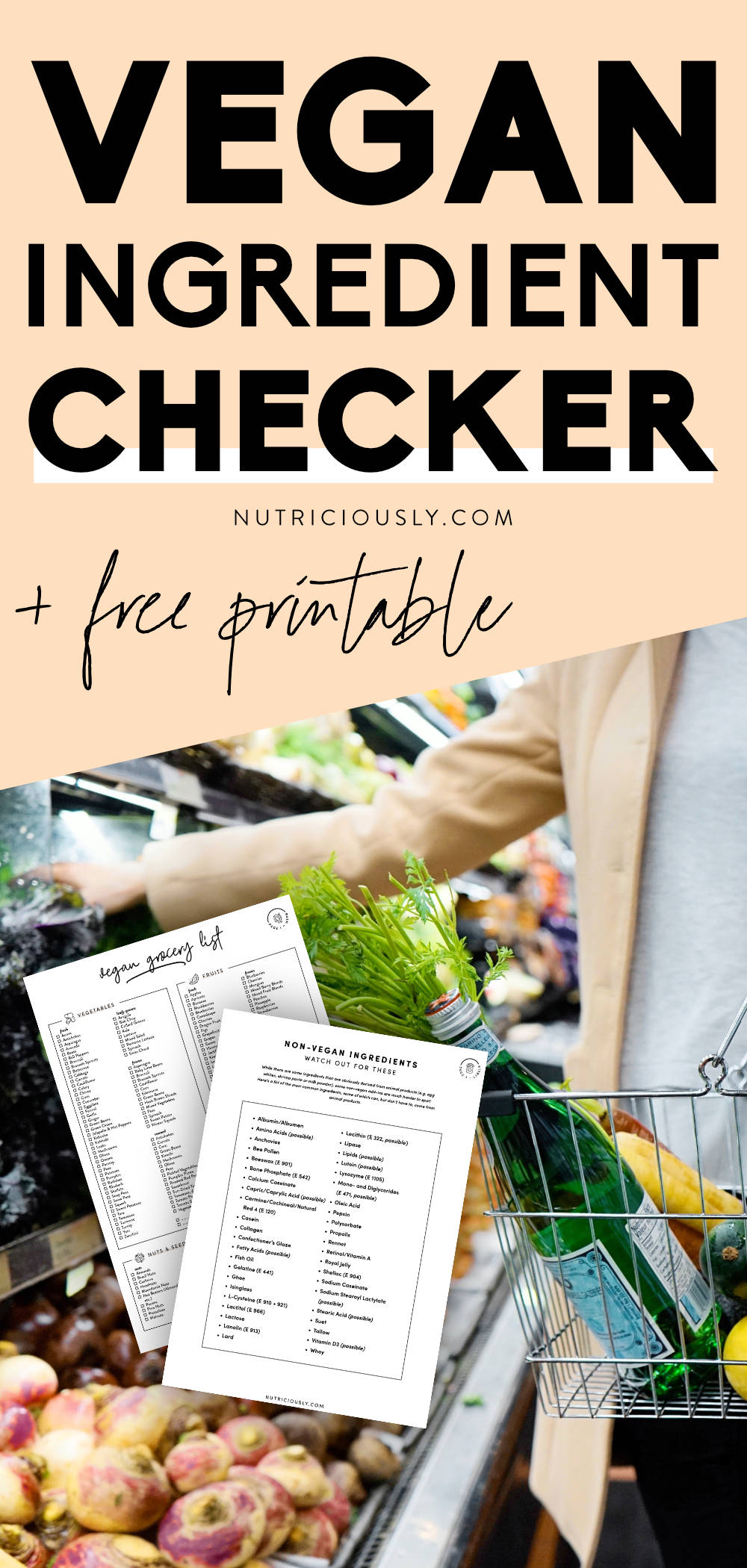
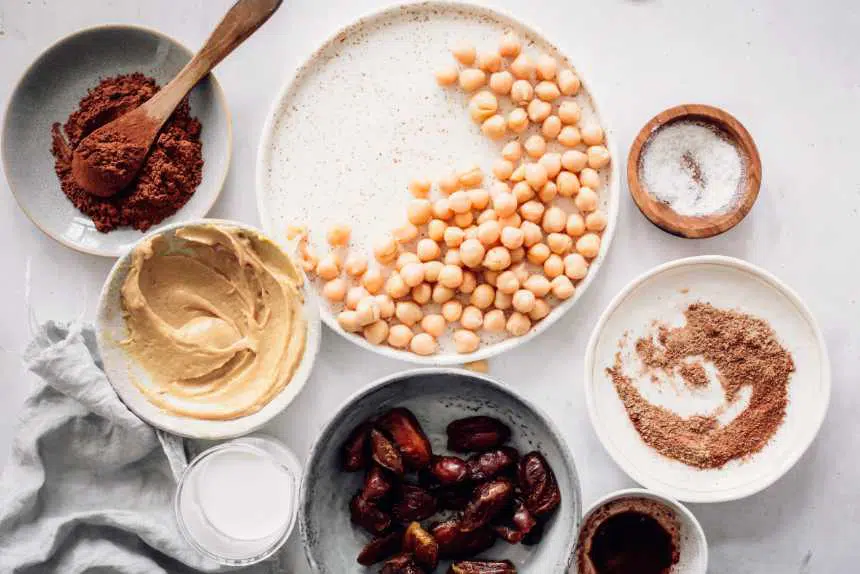
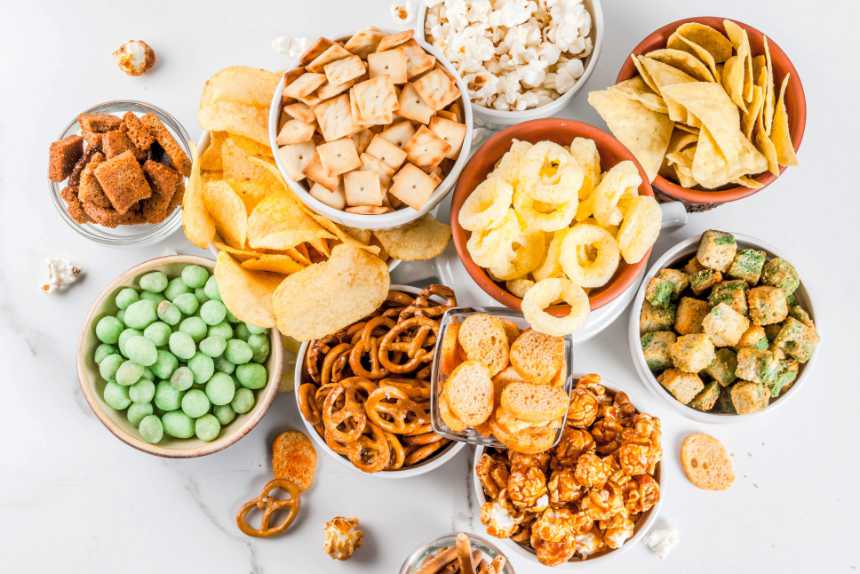

 Alena Schowalter is a Certified Vegan Nutritionist who has been a vegetarian since childhood and vegan since 2012. Together with her husband, she founded nutriciously in 2015 and has been guiding thousands of people through different transition stages towards a healthy plant-based diet. She’s received training in the fields of nutrition, music therapy and social work. Alena enjoys discussions around vegan ethics, walks through nature and creating new recipes.
Alena Schowalter is a Certified Vegan Nutritionist who has been a vegetarian since childhood and vegan since 2012. Together with her husband, she founded nutriciously in 2015 and has been guiding thousands of people through different transition stages towards a healthy plant-based diet. She’s received training in the fields of nutrition, music therapy and social work. Alena enjoys discussions around vegan ethics, walks through nature and creating new recipes.
Hi, I am so excited to slowly move in a direction away from animal products with a focus on whole food-plant based eating but was really surprised to see these unhealthy choices on your OK list.
Other: mock meats, vegan cheese, frozen meals, Oreos, potato chips, etc.
Mock meats, vegan cheese products, frozen meals are full of preservatives, some are chemically-based foods created in a lab…..and why would Oreos and potato chips be good for a healthy lifestyle? Am I reading your list incorrectly?
Hi Eve,
thanks for your comment and great to know that you want to eat more plant-based foods and an overall healthy diet! This article here is about vegan vs. non-vegan ingredients and doesn’t claim to focus on healthy vs. not healthy (at least I hope so).
The thing is, processed foods are not per se bad for you and a small amount of any preservative or additive is very unlikely to be bad for you! Only if you eat certain ingredients in certain amounts. By all means, you don’t need to eat chips or Oreos (I personally don’t, hubby loves ’em) if you are vegan or plant-based; but if someone simply doesn’t want to contribute to animal suffering, it’s not necessary to abstain from these fun foods :) That was the point of this article.
Hope this makes sense! We have lots of content around whole food plant-based eating, perhaps this is for you.
Best,
Alena